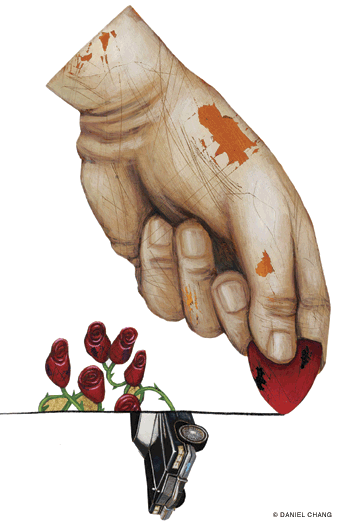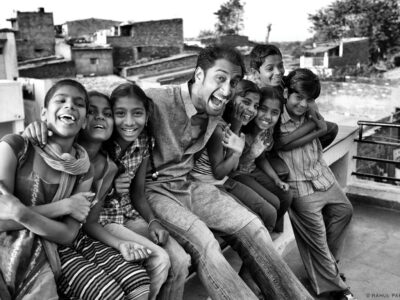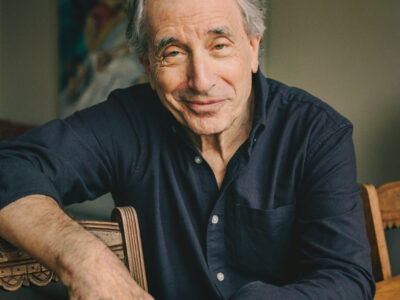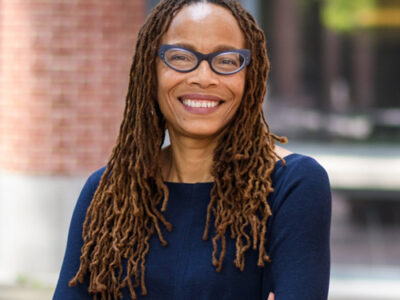
Roseanne Cash sat in the Arts Café, the chapel-like parlor in the Kelly Writers House where writers come to read aloud. She was dressed in black, and she was there to talk about the craft of writing: prose as well as the country-ish songs for which she’s famous. Sitting beside her was Anthony DeCurtis, the music journalist and lecturer in creative writing at Penn, who prompted her with questions about her work.
It was the first Blutt Singer-Songwriter Symposium at the Writers House, and though the evening was billed as a “conversation,” Cash punctuated her remarks about songwriting with acoustic versions of “Black Cadillac,” “God Is in the Roses,” and “Seven Year Ache”—much to the delight of her fans in the room.
As many in her audience knew, Cash published a collection of short stories titled Bodies of Water in 1995. She is also writing a memoir, from which she read several passages, and is the editor of Songs Without Rhyme, an anthology of writings by songwriters, including one by her father, the late Johnny Cash. Yet when Bodies of Water was first published, she wrote in the foreword to Songs Without Rhyme (which was read aloud by Al Filreis, the Kelly Professor of English and faculty director of the Writers House), she “got a lot of comments, some from close friends, along the lines of, ‘Well now you’re a real writer:’”
This was meant to be a compliment. I was appalled and frustrated to discover that songwriting was still perceived as not quite legitimate writing, a poor cousin of poetry, without the reverence. In truth, the demands of serious songwriting are rigorous, solitary, and require the same degree of commitment as any other writing.
I often lament that true songwriting will end up as an arcane folk art like Appalachian basket-weaving or divining water with a stick. In dark moments, I suspect that no one really appreciates the beauty of a precisely rhymed couplet sung perfectly in tune, a heartrending melody delivered in an honest voice.
In keeping with the spirit of Cash’s conversation with DeCurtis and the audience, here is an edited version of that conversation.
Who were some of the writers [you’ve admired], and how did you get interested in writing? Obviously your father was a songwriter, but kids see performers, so when you thought about being a writer was it through books that you read, or songs that you heard, or meeting songwriters?
I was a passionate reader as a child. I was the kid who asked to be trapped at the library on Saturday afternoons. It’s terribly geeky but it’s true. So I developed a love of language—actually, I got that honestly, my dad’s love of the English language and the poetry in inherited form. But I didn’t want to be a performer. I didn’t need that much attention, and I didn’t want that much attention.
I wrote poetry through my childhood and teens, and when I was 18 I started writing songs, and I thought, “This is a noble profession, to write the words and music for someone else to sing.” I thought this is what I would do with my life—then I made a demo and cut a record deal …
I’m sure that people also think you’re semi-Appalachian, when really you grew up in California and heard all the British Invasion stuff on the radio. Can you talk about the kind of impression that made on you?
Well, I had this threefold series of inspiration. My father’s music, obviously. The music that my mother listened to, which was Patsy Cline, Ray Charles, Marty Robbins, and that ilk. And then the Beatles came on the radio, and I started really paying attention to songwriting. The Beatles’ song structures are so perfect, and the trick they did with turning the chord progressions in the verses on its ear to go to the bridge, all that was fascinating to me.
But I still thought it was a man’s province until I heard Joni Mitchell, and then I said, “Oh, a woman can actually do this, can make a profession of this, and have her experience and her poetry be valid enough to put out into the marketplace.”
Speaking of personal songwriting, would you play a song for us?
I don’t usually talk about my songs like this, but since this is the group to do it in, I guess … I had a foreboding of death, and it wasn’t that alarming to me because my father had been sick for about 10 years, but this foreboding was unusual because it came with the image of this Cadillac. The Cadillac was a very iconic image from my childhood, because both my parents always drove black Cadillacs and would trade in each year for a new black Cadillac. My whole childhood was behind a black Cadillac. But of course it’s the last car that drives you away and it’s a metaphor for death too, so it seemed to fit perfectly. But after I wrote this song my heart burst on the paper. A lot of times songs can be postcards from the future, and this one was because six weeks later my stepmother died, so …
[She plays “Black Cadillac.”]
Obviously when June Carter [Cash’s stepmother] died and when your father died, there was this process of public mourning. At the same time your feelings are so personal. Could I ask you about negotiating between those realities: this kind of public world and then the feeling that led to creating an album like Black Cadillac.
Well I became very disciplined about keeping my mourning private. And it helped me become a better writer, because when I came to that—I hate to call it source material, but it actually was. It was pure; it wasn’t polluted by some kind of mythic idea about what it was or who they were, what it should be, so I felt free to explore the terrain of mourning just as any human being, any writer would. It didn’t matter what the back story was or who the people were.
[Audience member:] You have a spectacular voice. How important has that been in your development as a songwriter?
I write within my limitations. Style is a function of limitations, and I’m very well aware of that. I never really liked my voice; I never considered myself a real singer. I always thought Joni [Mitchell] was a real singer; I thought Renée Fleming is a real singer. I was very hard on myself, for all of my career, about my voice. I always heard the note I missed or the phrase I missed; it could have been better. Really pathological.
Then I lost my voice. For 2 years I had vocal polyps. I couldn’t sing; I could barely speak. That was transformative. I thought, “If I ever get my voice back, I’m not going to criticize myself.”




